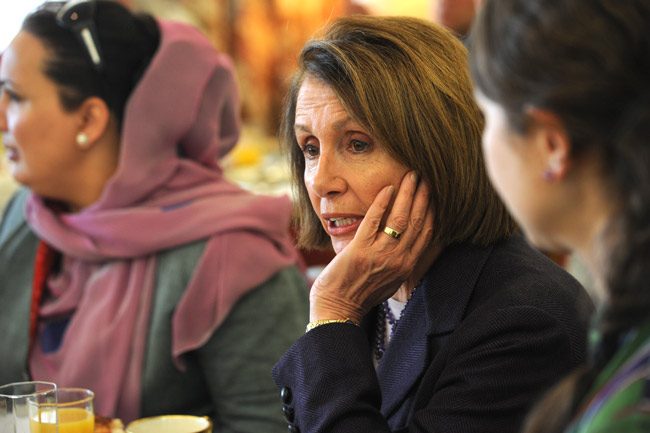
By Norman Solomon
When Democrats take control of the House in early January, they’ll have two kinds of leadership—one from the top of the party’s power pyramid, the other from its base. With formal control, Nancy Pelosi and Steny Hoyer can brandish huge carrots and sticks to keep Democratic lawmakers in line. With grassroots support, a growing number of those lawmakers can—and should—strategically step out of line to fight for progressive agendas.
Pelosi and Hoyer have been running the Democratic machinery in the House of Representatives since 2003, and they’re experts at combining liberal rhetoric with corporate flackery. Pelosi is frequently an obstacle to advancing progressive proposals. Hoyer is significantly worse as he avidly serves such “constituents” as giant banks, Pentagon contractors and other Wall Street titans. The duo has often functioned as top-drawer power tools in the hands of powerful corporate-military interests.
Pelosi is a longtime wizard at generating and funneling hundreds of millions of election-cycle dollars, and as speaker she’ll wield enormous power over committee assignments. But she must keep Democratic House members minimally satisfied—and along the way that should mean yielding more power to the Congressional Progressive Caucus. Buoyed by wins in the midterm elections, the caucus includes two-fifths of all Democrats in the House.
That’s where the other kind of leadership comes in—if a hefty number of self-identified progressives in Congress go to the mat to vigorously represent progressive constituencies. For that to happen, a dubious aspect of the Progressive Caucus past must not repeat itself.
“When historic votes come to the House floor, party functionaries are able to whip the Progressive Caucus into compliance,” I wrote six years ago. A grim pattern set in during the Obama presidency, “with many Progressive Caucus members making fine statements of vigorous resolve—only to succumb on the House floor under intense pressure from the Obama administration.”
 Backing down had tragic consequences for the nation’s healthcare system. In September 2009, Progressive Caucus leaders sent a letter to President Obama pledging not to vote for any healthcare bill “without a robust public option.” They wrote: “Any bill that does not provide, at a minimum, a public option built on the Medicare provider system and with reimbursement based on Medicare rates—not negotiated rates—is unacceptable.” Six months later, every member of the Progressive Caucus abandoned the demand and voted for a healthcare bill with no public option at all.
Backing down had tragic consequences for the nation’s healthcare system. In September 2009, Progressive Caucus leaders sent a letter to President Obama pledging not to vote for any healthcare bill “without a robust public option.” They wrote: “Any bill that does not provide, at a minimum, a public option built on the Medicare provider system and with reimbursement based on Medicare rates—not negotiated rates—is unacceptable.” Six months later, every member of the Progressive Caucus abandoned the demand and voted for a healthcare bill with no public option at all.
In recent years, the leadership of the Progressive Caucus has become more impressive. The current mix of leaders and new members—which includes veteran lawmaker Raul Grijalva, more recent House arrivals like Mark Pocan, Pramila Jayapal and Ro Khanna, and notable incoming progressives such as Alexandria Ocasio-Cortez, Ilhan Omar, Rashida Tlaib and Ayanna Pressley—seems to augur well.
There are encouraging signs that Congressional Progressive Caucus leaders are using new leverage to gain more power for progressives. After meeting with Pelosi on Nov. 15, Co-Chair Pocan and First Vice-Chair Jayapal released a statement saying “we are pleased that Leader Pelosi shares our commitment to ensuring that CPC members are represented proportionally on the key exclusive committees—including Ways and Means, Energy and Commerce, Appropriations, Financial Services and Intelligence.”
Progressive leaders can gain persuasive influence largely because they’re advocating for proposals that—as polling verifies—have wide support from the U.S. public, such as a $15-an-hour minimum wage (59 percent), Medicare for All (70 percent), progressive criminal justice reform (65 percent) and higher taxes on the wealthy (76 percent). Behind such political agenda items is an activist base eager to achieve many programs that have been obstructed by most top-ranking Democrats in Congress.
Clearly, much of the Democratic Party’s momentum is now coming from the left. And many of the positions that the timeworn Democratic leadership has staked out are now being overrun—outmatched by the cumulative power of dynamic social movementsthat have generated electoral clout. Medicare for All is a case in point, with numerous likely Democratic presidential candidates climbing on board.
Ultimately, the most profound progressive leadership for Congress isn’t in Congress at all. It’s in communities and movements across the country—nurturing diverse progressive strengths in many aspects of social change, including at election time.
No matter how intense the top-down pressure gets from Speaker Pelosi, we should insist from the bottom up that members of Congress stand their ground for progressive principles. And—no matter how fervently they embrace the “progressive” label—if congressmembers aren’t willing to fight for those principles, then the grassroots should mobilize: to create an outcry, to lobby and to consider launching primary challenges. No elected officials should be immune from scrutiny and accountability.
![]()
 Norman Solomon is co-founder of RootsAction.org and founding director of the Institute for Public Accuracy. His books include “War Made Easy: How Presidents and Pundits Keep Spinning Us to Death” and “Made Love, Got War: Close Encounters with America’s Warfare State.”
Norman Solomon is co-founder of RootsAction.org and founding director of the Institute for Public Accuracy. His books include “War Made Easy: How Presidents and Pundits Keep Spinning Us to Death” and “Made Love, Got War: Close Encounters with America’s Warfare State.”





























Bill says
So the far left is out of touch with the extreme far left.
ASF says
And many people might say that the “progressive insurgents” are out of touch with reality.
Alphonse Abonte says
Incoming House Speaker Nancy Pelosi is doubling down on her plan to open America’s doors to undocumented immigrants with a promise to pass the Dream Act and comprehensive immigration reform.
Under pressure to move on the two packages in the face of opposition from the GOP and White House, the California congresswoman indicated that they will be among the initial moves by the new Democratic majority.
In a column co-written with House Rep. John Sarbanes of Maryland, the immigration issues were packaged in a paragraph where the duo promised to “make life better for all Americans.”
Those targeted by the Dream Act are not citizens or even documented. The act targets children brought illegally into the United States and would provide a path to citizenship, sometimes referred to by critics as amnesty.
About 3.6 million or more would be covered by the program, or a population the size of Puerto Rico.
A different program instituted by the Obama administration called Deferred Action for Childhood Arrivals targets about 700,000 younger illegal immigrants for temporary citizenship.
In the Washington Post, Pelosi and Sarbanes wrote, “We will confront discrimination with the Equality Act , pass the Dream Act to protect the patriotic young undocumented immigrants who came here as children, and take the first step toward comprehensive immigration reform.”
Their pledge comes as a “caravan” of migrants from Central America is trying to cross into the United States despite pledges by the president to stop them.
Deb says
Solomon, speaks like the true Democratic he is. But Pelosi has had so many chances, its time for some younger blood in that position.
Michael Cocchiola says
Here’s the good news…Democrats crushed Republicans in U.S. House races across the country – +39 and counting – leading to a Democratic takeover of the House. Democrats flipped seven governorships, six state legislative chambers, and more than 300 state House and Senate seats. And, Dems got 8 million more votes, nationwide, than Republicans. So all you Republicans who believed your Great Leader’s claim of a “near total” victory, you have been scammed once again. While you gained a couple of Senate seats, you already had a majority and it still realistically takes 60 votes to pass on proposed legislation. But more importantly, it is the House that writes proposed laws and budgets. It will be a Democratic majority that controls committee chairs. It will be Democrats investigating the Trump cleptocracy. And if warranted, It will be the Democratic House that writes the articles of impeachment. Have a great holiday!
James says
Nice little hot air rant – The house can not get a single bill through without the senate approval- Also the senate majority is also aligned closer to the electorate then the house- Which means that Trump would lose the popular vote by bigger margins in 2020 but has a better then not chance of winning the Presidency- Remember California, New York and Illinois do not decide who the President will be
Alphonse Abonte says
Even though the Dems won the House, they lost the Senate. The Dems will waste the next two years playing games trying to implement their OWN agenda, not the peoples. Watch, more to come.
mausborn says
Donald Trump, Rick Scott, Marco Rubio & Paul Ryan all lied about Dems committing voter fraud while GOP actively committed absentee ballot fraud in NC to steal Congressional election. This should be much bigger story and should be reported!
Pogo says
@In praise of truth
There Will Never Be an Honest Conversation About Nancy Pelosi as a Political Leader
Sexism doesn’t just harm women in politics. It also poisons political analysis.
By Christina Cauterucci
“…Advocates for gender equity sometimes encourage people to imagine the advances humanity might make, or might have made earlier, if half the world’s intellect were valued and utilized as much as the other’s. I wonder what the Democratic Party might accomplish if people on the left didn’t have to spend so much time rebutting gendered attacks on their female elected officials and could instead talk about whether they’re good at their jobs.”
https://slate.com/news-and-politics/2018/11/nancy-pelosi-speaker-of-the-house-sexism.html
trump 10 to 20 – maga